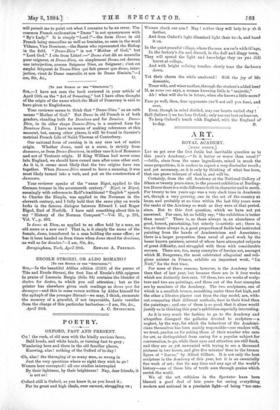Fro THE EDITOR OF THE "SPECTATOR."]
&a,—I have not seen the book reviewed in your article of April 26th on the "Art of Swearing," but I have often thought of the origin of the name which the Maid of Domremy is said to have given to Englishmen..
Your reviewer seems to think that " Dame-Dien " as an oath means "Mother of God." But Dame in old French is of both genders, standing both for Dominus and for Domina. Dame- Dieu, in its older shape Damne-Dieu, is a received form for Dominus Deus. I have no means of making references at this moment, but, among other places, it will be found in Garnier's metrical French Life of Saint Thomas of Canterbury.
Our national form of cursing is in any case not of native -origin. Whether damn, used as a curse, is strictly from olamnare, or from Dame-Dominus, in either case it is of Romance and not of Teutonic origin. If King William had never come into England, we should have cursed men after some other sort. As it is, it seems most likely that the two origins have run together. When Damne-Dieu ceased to have a meaning, it was most likely turned into a verb, and put on the construction of olamnare.
Your reviewer speaks of the "name Bigot, applied to the German trooper in the seventeenth century." Bigot, or Bigod, seemingly with reference to Rolf's traditional " English " speech to Charles the Simple, was applied to the Normans in the eleventh century, and I fully hold that the same play on words lurks in the famous dialogue between Edward I. and Roger Bigod, Earl of Norfolk. I have said something about this in my "History of the Norman Conquest "—Vol. II., p. 291, Vol.• V., p. 893.
Is dame at Eton, as applied to an office held by a man, an old name or a new one P That is, is it simply the name of the female, dame, transferred to a man holding the same office ; or lhas it been handed on from times when dame stood for clominue, as well as for doraina f—I am, Sir, &c., Seragingham, York, April 29th. EDIVLLED A. Fatzu&N.


































 Previous page
Previous page